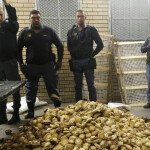Change has marked Chile’s mussel industry over the last four years, with economic, environmental and technical issues influencing Chile’s second most important aquaculture product. And more changes are expected in the coming years, as the country pushes ahead with a major export drive.
Up to 2008, the industry experienced a long period of impressive growth, which saw the value of exports rise to USD 130 million. This came to a halt in 2009, when rapid unplanned growth, combined with international financial chaos, saw export prices tumble, especially to Europe.
Around the same time, production problems started to occur, which reduced the volumes of good quality stock available for harvest. The problems were variously attributed to La Niña reducing water temperatures, overstocking of the farms, poor farming techniques and changes in demand for particular sizes of mussels. This combined drop in volume and price resulted in the total value of 2009 exports falling 28.5 percent.
In February 2010 Chile was hit by a severe earthquake and tsunami, which disrupted normal water levels and currents at some farms, damaging stock in the water and affecting mussel growth. There was also widespread damage to the road infrastructure and power supplies, which affected processing and transport capabilities. Despite these problems, production levels and mussel exports rose around 30 percent, although unit prices fell 10 percent.
Part of the export recovery came from increased orders from traditional EU markets, but also from a focus on new destinations such as Russia and Brazil, which are seen as good long-term market prospects. An ongoing export drive to Russia centred on promotions in Moscow and St. Petersburg and exploited the newly created “Patagonia Mussel” brand, with its image of mussels naturally grown in remote areas of cool, clean, unpolluted waters.
In 2011 exports and prices continued to improve, with an impressive increases of 46 percent in volume and 72 percent in value, driven mostly by a recovery of the traditional market for frozen mussel meats to the EU and United States.
However, AmiChile, the mussel farmers’ association, believes that over-reliance on this single sector is a weakness, and hopes to diversify the markets, with a greater emphasis on premium quality products. To this end, authorization was sought and granted in April 2012, for the export of live mussels into the EU. This will pave the way for access to the higher-value end of the European mussel market.
Some companies have concentrated on eco-labeling to ease their way into Europe, with a number of producers gaining Friend of the Sea certification, and one company, Toralla SA, currently under assessment against Marine Stewardship Council standards.
With market access open, the question now is will production be able to keep up with demand? Some industry insiders have their doubts, as much of the recent modernization has been of processing plants, rather than production capability of the farms. Joe Franklin of Quality Equipment, an Auckland, New Zealand-based mussel gear specialist, explained that many Chilean family-based companies have upgraded to New Zealand-style ropes, harvesting equipment and cultivation techniques, and are reaping the benefit of improved quality and greater volumes. However, it seems that some of the large Spanish-based companies are slower to change, and have yet to adopt the technique of controlled density farming, which is needed to ensure good meat yields and optimum growth.
It seems likely that low plankton levels last year will cause a reduction in this year’s harvest, and reports of serious declines in spat settlement in many areas could also reduce production in 2013 and 2014. Theories about the declines include volcanic activity, low temperatures, poor food availability and changes in flow patterns since the earthquake. So far there does not seem to be any common cause, and no significant disease problems have been found.
Whichever way the various problems and new market potentials resolve themselves, it seems likely that the Chilean mussel industry will remain in a state of flux for the foreseeable future, which could have unpredictable effects on the world and particularly the EU mussel market.






